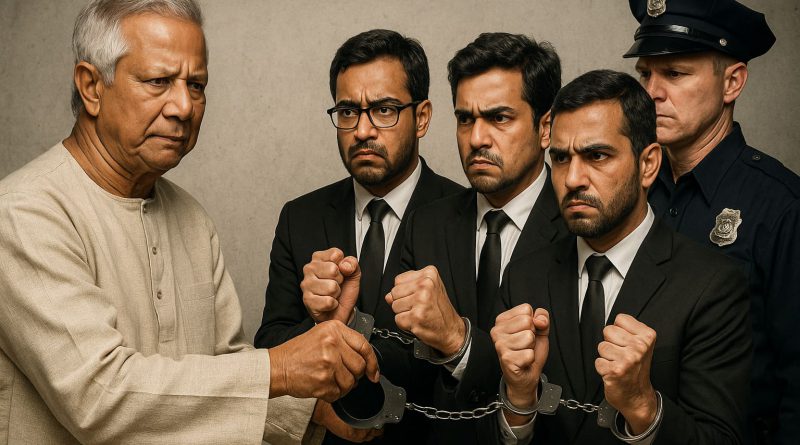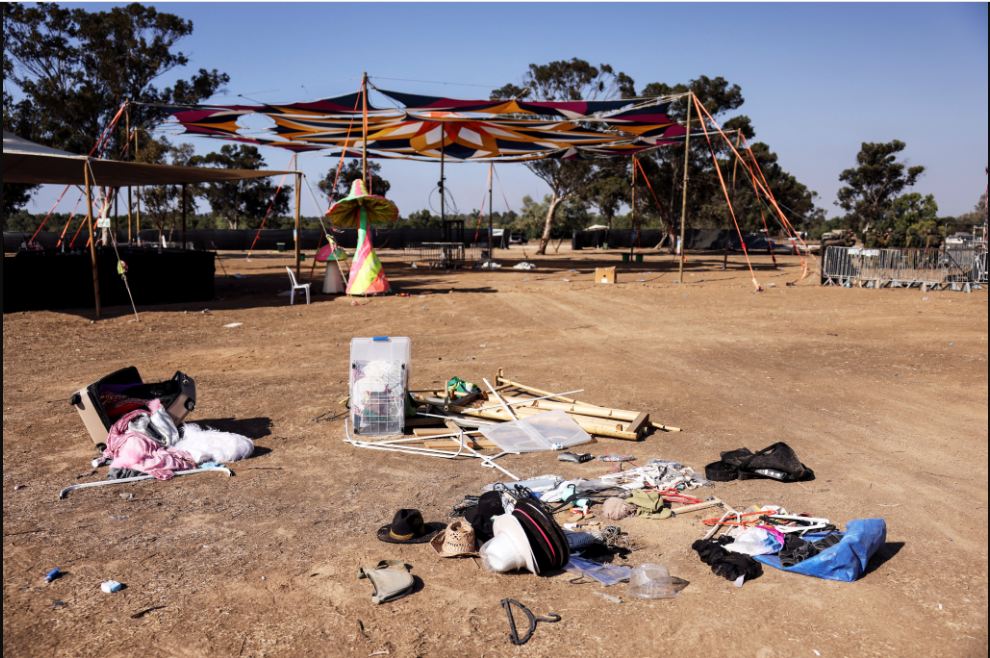OPINION: Why Is the Yunus Government Brutally Targeting Lawyers in Bangladesh?
By Advocate Shahanur Islam
Perhaps the most dangerous tactic employed by the Yunus government is the use of fabricated charges against lawyers in an attempt to discredit and neutralize them.
In an unprecedented and deeply alarming move, the interim government of Bangladesh, led by former Nobel Peace Laureate Professor Muhammad Yunus, has launched a systemic campaign aimed directly at the country’s legal community.
According to documentation from JusticeMakers Bangladesh in France (JMBF), since assuming power in August 2024, the Yunus administration has orchestrated an alarming series of politically motivated arrests, fabricated charges, killings, forcible possession of the Bangladesh Bar Council and other district bar associations, and physical attacks targeting lawyers.
Over 391 legal professionals are now facing false accusations such as murder and explosive explosions. More than 131 have already been arrested, some detained without charges solely for their professional activities and political beliefs, while many more have been subjected to abuse, threats, and harassment. What we are witnessing is not a series of isolated incidents, but a deliberate, orchestrated attack on the rule of law and the very independence of Bangladesh’s judiciary.
This unprecedented crackdown on lawyers, many of whom are simply fulfilling their professional duties, reflects the government’s growing authoritarian tendencies and its determination to quash any form of political opposition. In doing so, it poses an existential threat to the fundamental principles of justice, constitutional rights, and democratic governance in Bangladesh.
Arrests and Arbitrary Detentions: The Systematic Repression of Lawyers
The Yunus government has weaponized the arrest and detention of lawyers as a tool of political repression. The arbitrary arrests, often conducted under the cover of night, are carried out without regard for due process and with complete disregard for human rights and the legal protections that should be afforded to all citizens. These actions are meant to send a clear message to the legal community: dissent will not be tolerated.
On April 7, 2025, Barrister Turin Afroz, a former ICT prosecutor, was arrested from her home, only months after surviving a brutal physical assault by unknown assailants. The attack on her was never investigated, and now she is facing arrest in what appears to be retaliation for her legal work. Other prominent figures, such as Advocate Khan Md. Alauddin and Advocate Rezaul Karim Khokon, have similarly been targeted in politically motivated arrests aimed at silencing those who dare to speak out or represent clients from opposition groups.
The arbitrary nature of these arrests was further highlighted on April 6, 2025, when 84 pro-Awami League lawyers were thrown into jail after a Dhaka Metropolitan Sessions Judge overruled anticipatory bail granted by the High Court. This flagrant violation of established legal procedures not only undermines the judiciary’s independence but also exposes the government’s determination to bend the legal system to its will, regardless of constitutional guarantees.
Many of these lawyers are held without charges, often denied access to legal counsel and forced to endure harsh conditions in jail. They are also treated inhumanely, with their hands cuffed behind their backs. This behavior is in direct violation of Bangladesh’s constitutional protections and international human rights standards. The clear intent behind these arrests is not to administer justice but to intimidate and silence a professional community that has historically been one of the strongest defenders of democratic rights.
Fabrication of Charges: A Political Witch Hunt
Perhaps the most dangerous tactic employed by the Yunus government is the use of fabricated charges against lawyers in an attempt to discredit and neutralize them. By leveling baseless accusations such as murder, explosives, or assault, the government not only attacks individual lawyers but attempts to delegitimize the entire legal profession as a whole.
On February 12, 2025, 32 lawyers were falsely accused of attacking student protesters in Comilla—a charge entirely fabricated to undermine opposition voices. Similarly, in February 2025, 144 pro-Awami League lawyers were falsely implicated in an assault and attempted murder case linked to protests from the July movement. These false charges are not isolated incidents but part of a pattern of politically motivated persecution designed to punish those who dare to challenge the status quo.
In November 2024, 70 lawyers from Chattogram were falsely charged under the Explosives Act, a draconian law that permits severe penalties. Eleven other lawyers were implicated in the death of a street vendor, despite a complete lack of evidence to link them to the crime. These fabricated charges not only violate the fundamental rights of lawyers but also serve as a calculated strategy to suppress opposition and silence political dissent.
The Yunus government has clearly weaponized the justice system for political purposes. It sends a chilling message to the legal community: challenge the government, defend political dissidents, or even represent those the government dislikes—and you will face fabricated charges that could ruin your career, imprison you, and destroy your reputation.
Physical Attacks and Intimidation: Cultivating Fear Among Lawyers
The Yunus government’s attack on the legal profession is not limited to arrests and fabricated charges. There has been a disturbing rise in physical violence aimed at intimidating lawyers into silence. Such acts of brutality serve to create a climate of fear and compel legal professionals to think twice before representing clients that may be seen as politically sensitive or opposition-affiliated.
In March 2025, three prominent lawyers from Jamalpur were brutally attacked while performing their professional duties. Similar violent incidents have occurred at various courts, with lawyers like Morshed Hossain Shaheen and Sheikh Farid subjected to mob violence in Dhaka. In August 2024, Barrister Ashraful Islam was stabbed in the Supreme Court Bar Association building—a brazen act of violence meant to send a clear message to all lawyers: if you challenge the government’s actions or defend political dissenters, you risk your safety.
These incidents of physical violence are not random acts; they are part of a deliberate strategy to suppress opposition and instill fear. Lawyers are increasingly reluctant to take on cases that challenge the government’s position or represent opposition figures. The result is a paralyzed legal community unable to perform its crucial role in upholding the rule of law.
Killings: The Ultimate Form of State Terror
The attack on Bangladesh’s legal community has escalated to the point where the lives of lawyers are at risk. In April 2025, Advocate Sujon Mia, a former student leader and a member of the Moulvibazar District Bar Association, was brutally stabbed to death by a group of youth miscreants. It is alleged that he was killed because he represented politically motivated accused individuals affiliated with the Bangladesh Awami League and its associated wings in court.
Earlier, on August 5, 2024, young lawyer Nayan Sheikh, affiliated with the Bangladesh Awami League, was fatally hacked to death at his home in Bagerhat, following the fall of the previous Awami League regime.
On November 26, 2024, lawyer Saiful Islam, an Assistant Public Prosecutor, was killed during a clash in Chattogram involving supporters of Hindu leader Chinmoy Krishna Das Brahmachari, police, and BGB forces. These killings represent the ultimate form of repression, aiming not only to eliminate outspoken legal professionals but also to instill a pervasive fear that further discourages any form of resistance.
Electoral Obstruction and Democratic Sabotage
The Yunus government has also taken steps to obstruct the democratic process, particularly within the legal community. These efforts have included direct interference in bar elections to ensure that only those loyal to the regime are allowed to hold key positions. As soon as the Yunus government took power, the Bangladesh Bar Council office was forcibly taken over by unelected pro-BNP-Jamaat lawyers, along with the Dhaka Bar Association and Khulna Bar Association offices.
On April 10, 2025, in Chattogram, pro-Awami lawyers were barred from collecting nomination papers for the Bar election, a blatant attempt to prevent any opposition from gaining power within the legal profession. This incident is part of a broader pattern of electoral obstruction across the country, as seen between January and March 2025, when lawyers affiliated with the ruling coalition were forcibly prevented from contesting bar elections in Rajbari, Naogaon, and Sirajganj. In Dinajpur, 13 candidates were disqualified on purely political grounds.
Such actions are a direct assault on democratic processes, as the ruling regime seeks to eliminate any independent voices within the legal community. By controlling the electoral process within the Bar, the Yunus government is ensuring that no opposition remains within the structures that could hold it accountable.
A Descent into Authoritarianism
The systematic targeting of Bangladesh’s legal community is not just an attack on individual lawyers—it is an attack on the very pillars of justice, democracy, and the rule of law. Under the Yunus administration, the government has steadily shifted towards authoritarianism, systematically dismantling the democratic structures that have historically held the state accountable.
The legal profession, with its long-standing ties to the opposition and its role in defending human rights and political freedoms, has become a primary target. The Yunus government understands that by silencing lawyers, it can eliminate the last remaining check on its growing authoritarian tendencies. This attack on the legal profession is part of a broader strategy to eliminate all sources of opposition and dissent. With the legal community neutralized, the Yunus government would be free to govern without scrutiny, accountability, or restraint.
The International Community Must Act
The international community must not stand by idly while the legal profession in Bangladesh is systematically dismantled. It is imperative that foreign governments, international legal bodies, and human rights organizations come together to hold the Yunus government accountable for its actions. Sanctions, travel bans, and other diplomatic measures should be considered to signal that the international community will not tolerate such blatant violations of human rights and the erosion of judicial independence.
Bangladesh’s legal community plays a critical role in defending the rights of citizens, ensuring justice, and holding the government accountable. If left unchecked, this attack on lawyers will not only destroy the independence of the judiciary but also undermine the foundations of democracy in Bangladesh. The world must take action to prevent this authoritarian descent from further dismantling the very fabric of the country’s democracy.
A Call for Resistance
The assault on Bangladesh’s lawyers is an assault on democracy itself. It is a calculated attempt by the Yunus government to consolidate power and eliminate any form of dissent. The targeting of lawyers—through arrests, fabricated charges, physical violence, and killings—is a deliberate strategy to weaken the legal profession and undermine the democratic principles upon which Bangladesh was built.
The people of Bangladesh, along with the international community, must stand in solidarity with the legal profession and demand an immediate end to this repressive campaign. The future of Bangladesh’s democracy hangs in the balance. If the legal profession is silenced, if the rule of law is further eroded, the very foundations of the nation’s democracy will crumble.
The time to act is now. The legal community, civil society, and the international community must rise together to defend justice, human rights, and democracy in Bangladesh before it is too late.
Advocate Shahanur Islam is a Bangladeshi Human Rights Lawyer and Laureate 2023 of the French Marianne Initiative for Human Rights Defenders. Currently, he is working as the Founder President of JusticeMakers Bangladesh in France (JMBF).
Featured Image is AI-Generated.
Disclaimer: Views expressed by writers in this section are their own and do not reflect Milli Chronicle’s point-of-view.



